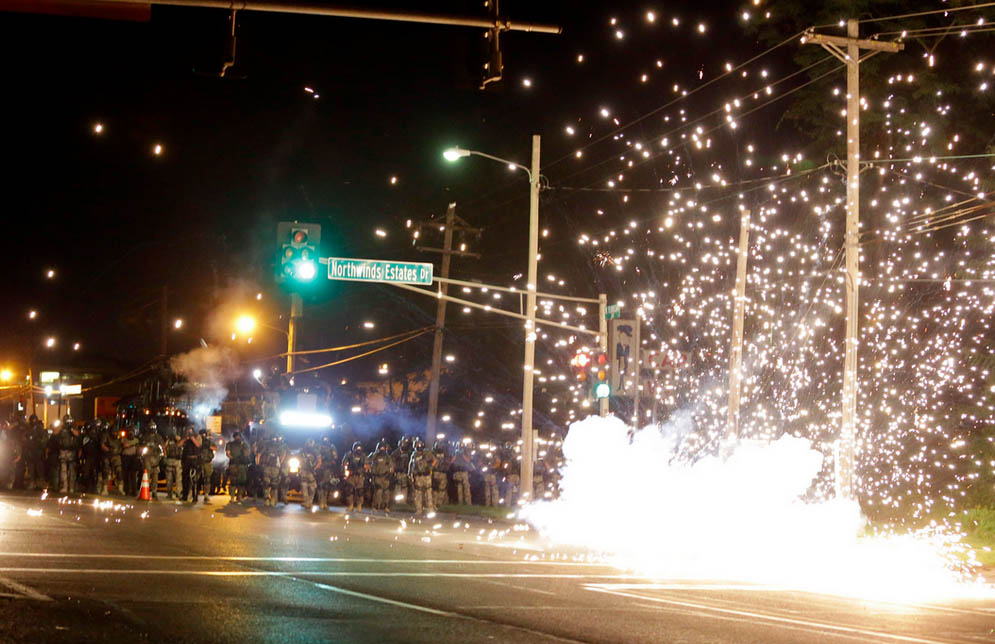Michael Brown was murdered by the Ferguson Police Department. There is no other word that can sufficiently describe killing an unarmed man, especially one who didn’t have a criminal record. Witness Dorian Johnson stated that an officer whom the Ferguson Police refuses to identify pointed a gun at Brown’s head instead of containing the situation with a cool head. Brown was executed. The civilians rightfully protested. Now the police fire upon everyone with rubber bullets and tear gas.
But the residents have not been "rioting." It just isn't true. Protesting: yes. Outraged: yes. Clashing with police: yes. Rioting: No
— Wesley Lowery (@WesleyLowery) August 13, 2014
The only detail that the police has revealed about the unidentified officer is that he was treated for swelling on the side of his face, but this is a woefully insufficient explanation. Just as instituting a no-fly zone “TO PROVIDE A SAFE ENVIRONMENT FOR LAW ENFORCEMENT ACTIVITIES” is a betrayal of the essential trust needed between police and citizens during a volatile time. Just as the Department of Defense’s militarization of police departments turns jurisdictional resources into a cruel cartoonish joke. Just as police muzzling and arresting veteran reporters like The Washington Post‘s Wesley Lowery as he was trying to piece together the maelstrom, with the preposterous rap of “resisting arrest” applied to a fair and innocent journalist holding his hands up high and terrified, is a desecration of civility, understanding, and free expression.
Murder. There is no other word to describe what happened to Michael Brown and what is now happening to our essential liberties. Just as there is no other word for what the New York Police Department did to Eric Garner in July; homicide was, after all, what the New York medical examiner concluded.
We wouldn’t have to use the word “murder” if these purported upholders of the law were responsible enough to own up to their mistakes or if our elected officials displayed swift and peremptory leadership. But they can’t. President Obama issues hollow statements. Governor Jay Nixon has displayed gutlessness and incompetence with his unfathomable silence. (Nixon broke his Marcel Marceau routine on late Wednesday night, asking for calm and urging “law enforcement to respect residents & press,” well after the time for conduction had passed.) The baleful mess in Ferguson, Missouri, especially harrowing in this YouTube video showing excessive force on peaceful protesters, has demonstrated that the American system is broken, that we are a nation that refuses to learn from its mistakes and that prefers to remain in denial about its deadliest problems.
We are now at a crucial point in history — one just as important as the epoch before Miranda rights were established — where we must understand that we have the power to say no, to not accept further abuse of police power, and to demand accountability and responsibility from callous ruffians who believe they can get away with sanctioned murder under the “serve and protect” lie. Because if we do not, we will come to take on yet another barbaric regularity of American life, one that an entire generation could grow up accepting without ever knowing another way.
[8/14/14 UPDATE: On Thursday afternoon, Governor Nixon pulled the St. Louis Police Department from Ferguson, replacing them with the Missouri Highway Patrol. MHP Captain Ronald Johnson has been overseeing operations with a cool head. Lowery reported that Johnson marched in the largely peaceful protest, with Johnson saying that he will tolerate neither looting nor “citizens not having ability to speak their minds” or having their rights violated. This is a much-needed and exemplary step in the right direction. The question now is whether the bad cops who attacked journalists and protesters will be named and brought to the appropriate justice.]

Ed,
Not to be argumentative, but I wanted to challenge a line at the top of your post.
“…especially one who didn’t have a criminal record.”
How does the use of the term “murder” hinge at all on someone’s criminal history? I don’t think it is any more a murder, or easily fall into that category, simply because he had no record, in the same way that the term “murder” shouldn’t be applied if someone did have a lengthy record. Just because someone has been or is a criminal, does that decrease the likelihood that one was executed?
Not being argumentative, just was hoping you would further your thought process surrounding that. It is less to put you on the defense as opposed to presenting me with a different way to look at things, if that makes any sense.
Christopher: Thank you for your comment and, yes, it’s a perfectly reasonable question. Since I am using the word “murder” in response to a police officer shooting an unarmed man, and since the Michael Brown robbery association is especially foggy, I am trying to provide some leeway for when a police officer accidentally shoots someone — a side issue that is also worth examining (and that I may look into in depth at a future point). Tennessee v. Garner permits law enforcement officers to use deadly force in the line of duty, but, in 1985, the police didn’t have anywhere close to the weapons arsenal that it possesses now. One of the reasons that Supreme Court decision went down was because it was believed that deadly force was required when a police officer believed that a suspect posed a significant threat. Obviously, one wants to consider all perspectives (including the police’s) when thinking about an issue like this. But is an unarmed man a significant threat? Why should homicide be the default response in such cases?